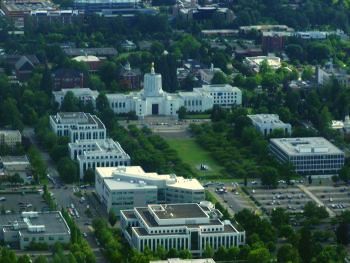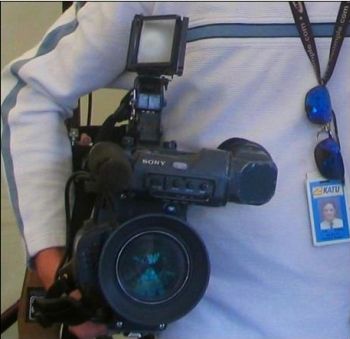
Publisher:
Bonnie King
CONTACT:
Newsroom@Salem-news.com
Advertising:
Adsales@Salem-news.com

~Truth~
~Justice~
~Peace~
TJP
Nov-18-2011 03:07

 TweetFollow @OregonNews
TweetFollow @OregonNews
What About Salem?
Tim King Salem-News.comColumbia Journalism Review examines the lack of progressive media coverage in places like Modesto, and we explain our experience trying to implement local news in a medium-sized U.S. city.
 Aerial view of Salem by Tim King |
(SALEM, Ore.) - Almost eight years have passed since the launch of Salem-News.com; which we hoped at the time would provide significant balance to the capitol city's traditional lack of news coverage.
The lesson we've learned over the years is that the journalism business community has overlooked the incredible opportunities that eventually will exist in local news through exclusively online content.
This was all I could think of or talk about, when we brought this group to life in 2004. I envisioned journalists banding together and launching Internet news groups that would play a role in their communities, one that amounts to a cross between local TV station, radio station and newspaper, with an interactive nature. The Internet is the only medium that allows the delivery of news in a multi-media environment.
An article by the editors of Columbia Journalism Review, titled, What About Modesto?, laments the continuing lack of news coverage there, and in our case you can follow a story of what happened when a group did try to use the Internet to create a valuable local presence, only to find little support, instead finding a specialty in political news on a much larger scale than local. People have been slow to wake up to the potential of Internet news in Salem, Oregon, and we've discovered in real time, many of the things revealed in the Columbia Journalism Review article about Modesto.
A Conspicuous Lack of Media in Medium Market Cities
 From the article What About Modesto? |
Salem like Modesto, is a one newspaper city with a population in the range of 200,000. There are many U.S. cities with a similar disposition, and seven years ago I saw local Internet news sites taking off like wildfire, but that never happened. Instead we were given the 'blog' or Web log, which is a Website that absolutely anyone can throw together and deliver whatever they want, including 'news'. Then we find ourselves confronted with terms like 'citizen journalist' and the bar falls and falls.
Journalism is about credibility and I don't want a 'citizen mechanic' to work on my car, and I don't want to be examined by a 'citizen doctor', etc. There is a reason people without proper training and background don't just become news reporters or columnists, I have always believed that there is a role for the citizen journalist, but it isn't in replacing professional news reporters.
Whereas Salem and Modesto and hundreds of other U.S. cities have populations close to or in excess of 250k with no TV stations and maybe one daily paper, the biggest example of the problem is found in Orange County, California, and equally in Riverside, San Bernardino, where millions of people live without TV news coverage, relying on the LA stations which have bureaus, but it isn't enough.
The Internet should have been enough to break the back of this problem, but Salem-News.com is one of the only news agencies launched that is exclusively online and staffed by experienced professional journalists, rather than 'citizen journalists'. In more recent years, some similar sites have appeared, staffed by former mainstream journalists. Some are non-profit, while others, like Veterans Today, are excellent, but somewhat specialized in nature.
The amazing thing is how the Internet allows reporters an infinite array of delivery methods, and I don't mind saying that it is incredible to edit our stories every day, arranging photo layouts, adding video codes, resolving html problems, promoting stories, it is a never ending cycle. Our product often has more of a magazine feel due to extensive photo and video use, and also through the utilization of all imaginable formatting methods, made possible by our Web Designer Matt Lintz, who created Salem-News.com in a way that would fully lend itself to our journalistic and visual aspirations.
Salem-News.com Background

From the beginning, we have been doing one thing and one thing only, and that is news. Initially, the two main news writers and editors were myself and Kevin Hays. Kevin had received several noteworthy awards for broadcast journalism while working as a radio reporter and news director in San Francisco and Sacramento, before returning to his home of Salem, Oregon.
My story was similar, I had many years at that point under my belt in both radio and TV news, and I was still a photojournalist and reporter for KATU, the ABC station in Portland, Oregon, when we started Salem-News.com. I had several broadcast and news photography awards, and Kevin and I received more over time as reporters with Salem-News.com.
Unfortunately, Kevin Hays relocated and moved on over time, but his contributions were substantial and his presence kept our content mostly local. In order to cover local Oregon soldiers, I traveled to Afghanistan where I spent two months covering their operations in the war. Later I went to Iraq where I spent a month embedded with a different Oregon Guard unit, but moving all over the country, and thus our international connections expanded and more and more writers in far away places began joining our team.
Today we have 97 contributors in almost 25 counties listed on our staff page and I publish the content of all. Daniel Johnson, Dr. M. Dennis Paul and Bob Collinsworth, are Assistant Editors, but as news editor I am behind 95% or more of everything you have seen published here in recent years, Kevin published a good share of our content but he has been gone for several years now. At this time we are approaching our 21,000th article. I work seven days a week, I've only gone to the Middle east and occasionally California, Washington and California and Canada to cover news. We have seen very substantial days of visitors and we have broken many important stories, holding the cover of sites like Digg and Reddit for an entire day or longer at times, but we are finding our value today in national and international reports and we have many specialties, most of which are not specifically local.
The Columbia Journalism Review article highlights the problem we observed locally more than seven years ago, as they exist today in Modesto, which statistically has much in common with Salem. First, some background on why some cities are seemingly overlooked particularly in TV news coverage.
Why Some Cities Have TV Stations and Some Do Not
 |
This story really begins in the late 1940's, when the NTSC (National Television System Committee) determined which American cities would have multiple competing television stations, and which would not. At that time each station had to be operated by a separate entity, today the FCC (Federal Communication Commission) has greatly relaxed those rules, offering corporations loopholes and the ability to operate multiple stations in a single market.
There are 210 U.S. media markets in TV and they are known as DMA's (designated market area). Number one is New York, #2 is LA, and so on. Most TV news people start in the small markets. While I had initial experience in the backwaters of the Portland market, my official entry into the world of TV news was in Yuma, Arizona, market #176 at the time. Then I went to Las Vegas, which was in the 70's when I arrived in late '97, and was close to top 50 market status over the next few years while I worked for both NBC and FOX affiliates. Bonnie King worked for a WB and an independent station.

When I was hired in Portland, Oregon, which has affiliate stations representing the four largest U.S. networks, (Salem has one low power broadcast TV station, which it is fortunate to have, and one full power station that is simply a signal for a shopping network) I entered the nation's 23rd TV DMA or market.
Before I switched over the Salem-News.com full time, I was offered a position at KRON, in San Francisco, which is a top-10 market; a position I did not ultimately accept. Naturally, the climbing of this ladder is what most aspire to do, and the pay rises as expected with market size. Unfortunately, this system also leads to quality reporters spending minimal time in smaller markets where they are often appreciated only briefly, before moving on to the next job in a larger DMA.
The Columbia Journalism Review article explains that Modesto is indeed overlooked and existing in the shadow of the contemporary Bay Area.
| “ |
In Modesto, California, the need for news far exceeds the current supply. A city of 200,000 with one midsized newspaper, a large Hispanic population, 16 percent unemployment, and the second-highest rate of car theft in the nation, Modesto lies just ninety-two miles east of San Francisco. But the spirit of news experimentation that pervades the Bay Area hasn’t crossed the Coastal Range. |
” |
 |
Their report cites how people in cities like Modesto tend to rely on 'legacy' or mainstream media and in the case of TV news, this tends to subject the viewer to a barrage of insurance and pharmaceutical ads which tell a great story about which industries have the deep pockets to support extremely high dollar media campaigns.
In Salem, the local daily is owned by the biggest newspaper chain in the world, and it is an extremely corporate-oriented operation where the reporters and photographers continue to lessen in number- their duties shared increasingly handled by smaller numbers of people. And even that newspaper, the Statesman Journal, is named for two different papers that once existed here but were absorbed into one.
The importance of competing media in a region is paramount. Reporters are the public's best weapon against political and general government corruption. The tides are working against corrupt politicians and officials who love one horse media towns where they can easily corrupt by buying or bullying, the local reporters and their editors.
Conversely, there is a long list of officials who work against the public interest who have been exposed in our reports, and they absolutely despise Salem-News.com, which is the proof of effectiveness.
The Internet gives media extraordinary opportunities, however as I have stated, the biggest problem is that journalists have not come across as we have to an exclusive Internet operation.
And investors have not had the foresight to see the vision either, though we have garnered support from many generous people and businesses and also see some advertising revenue. Many sites like ours rely primarily on Google Ad revenue, and that can become very realistic when our stories go viral, but beyond that we believe we have paid a great figurative cost for being ahead of our time.
A Profound Reach in the WorldThis article criticizes the status of media in smaller markets, however the fact that Salem-News.com found a larger calling has been beneficial in many ways thanks to the diversity of our team of writers. Perhaps the two biggest words in our vocabulary are 'Genocide' and 'Whistleblower'; we report as much as possible about the first, and attract an endless number of the second, and their related stories. There is a revolution against Whistleblowers right now just as there was a push to praise them years ago under Clinton. From secret nuclear weapons in Israel, to racism in Oregon state prisons; we are one agency that consistently protects and publicizes those who risk all to tell the world about injustice. Exposing the contamination of the El Toro Marine base in Southern California, addressing the subject of genetically modified food, telling the tragic stories from Palestine, revealing details about the Sri Lanka Tamil Genocide two years ago, updating readers on the successes and defeats of both legislative and volunteer projects to aid those affected by Agent Orange, releasing revelations about Murder and Genocide in Rwanda and other parts of Africa; the list is long and meaningful and only grows with time. The other developing aspect is that countries all over the world choke and restrict their press, and yet they can't restrict what Salem-News.com publishes, and as a result we allow people in these countries to receive vital information. |
Of course we still believe that Internet news is the answer, it just needs a fraction of what is constantly being invested in TV and print press. So far that hasn't happened, as Columbia Journalism Review states in their report.
| “ |
There are plenty of places like Modesto—small cities and towns with neither the demographics to attract outside news entrepreneurs nor the resources to develop their own. Their residents, generally less educated and less wired than their counterparts in major urban areas, continue to rely on legacy media. But many of those outlets are shrinking into insignificance, and it’s unclear what will take their place. |
” |
There just isn't a lot to be excited about when it comes to this subject, it is rather dismal now, but it doesn't always have to be. The Internet has literally replaced other media for millions already, and it seems fair to assume that the majority of American families are online today. Local Internet news agencies could be an incredible addition to so many communities.
The conclusion of the article about Modesto and media coverage in cities of a similar nature is a bitter pill of sorts for me, as the founder of Salem-News.com, but I agree with them completely.
| “ |
It’s easy to identify and praise promising news experiments; it’s harder to imagine the future of those places where bandwagons never go. If the digital-news revolution is to truly serve a mass audience, beyond educated and reasonably affluent urbanites, we must account for Modesto; we must find ways for innovation to flourish in poor towns where, for so long, it has been allowed to die. |
” |
There is hope for a brighter, more informed future in medium-sized U.S. cities, and I believe the potential for local news is still untapped. Hopefully in the future, far sighted investors who understand that we are long past the dot com crash, when the Internet was comparatively inferior, will come forward to aid groups in their efforts to restore much needed media coverage.
_________________________________________________________Tim King: Salem-News.com Editor and Writer
Tim King has more than twenty years of experience on the west coast as a television news producer, photojournalist, reporter and assignment editor. In addition to his role as a war correspondent, this Los Angeles native serves as Salem-News.com's Executive News Editor. Tim spent the winter of 2006/07 covering the war in Afghanistan, and he was in Iraq over the summer of 2008, reporting from the war while embedded with both the U.S. Army and the Marines. Tim is a former U.S. Marine.
Tim holds awards for reporting, photography, writing and editing, including the Silver Spoke Award by the National Coalition of Motorcyclists (2011), Excellence in Journalism Award by the Oregon Confederation of Motorcycle Clubs (2010), Oregon AP Award for Spot News Photographer of the Year (2004), First-place Electronic Media Award in Spot News, Las Vegas, (1998), Oregon AP Cooperation Award (1991); and several others including the 2005 Red Cross Good Neighborhood Award for reporting. Tim has several years of experience in network affiliate news TV stations, having worked as a reporter and photographer at NBC, ABC and FOX stations in Arizona, Nevada and Oregon. Tim was a member of the National Press Photographer's Association for several years and is a current member of the Orange County Press Club.
Serving the community in very real terms, Salem-News.com is the nation's only truly independent high traffic news Website. As News Editor, Tim among other things, is responsible for publishing the original content of 91 Salem-News.com writers. He reminds viewers that emails are easily missed and urges those trying to reach him, to please send a second email if the first goes unanswered. You can write to Tim at this address: newsroom@salem-news.com
Articles for November 17, 2011 | Articles for November 18, 2011 | Articles for November 19, 2011





Terms of Service | Privacy Policy
All comments and messages are approved by people and self promotional links or unacceptable comments are denied.
[Return to Top]
©2026 Salem-News.com. All opinions expressed in this article are those of the author and do not necessarily reflect those of Salem-News.com.